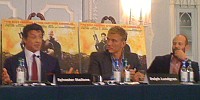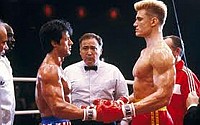 Totally prehistoric
Totally prehistoricSylvester Stallone, Jason Statham and Dolph Lundgren go old-school for The Expendables • Page 2 of 2

At the press conference: Stallone, Lundgren and Statham

Stallone and Lundgren
face off in Rocky IV
Below: no shirts required


JASON STATHAM
12 Sep 1972, London








DOLPH LUNDGREN
3 Nov 1957, Stockholm
THE EXPENDABLES (2010)
UNIVERSAL SOLDIER:
REGENERATION (2009)
UNIVERSAL SOLDIER (1992)
THE PUNISHER (1989)
RED SCORPION (1989)
MASTERS OF THE UNIVERSE (1987)
ROCKY IV (1985)
A VIEW TO A KILL (1985)


 Do you feel the need to justify the violence in your films?
Do you feel the need to justify the violence in your films?Stallone: The one thing in my films: I only kill people who need to be killed — killers killing each other. The ones that deserve to get it, they get it good, and the ones that go after women really get it. They say, "Oh, isn't that overkill?" But I'm not going to have a man really having his way with a woman, tearing her apart and wrecking her life and then just shoot him with a bullet. That's too civilised. He's going to feel real pain. And I think the audience has a cathartic feeling. Now if you did that in every scene then it's a horror film. I don't feel guilty about it at all — but if you want me to, I will.
What about the women being victims?
Stallone: It's like a throwback to the '80s. I wanted to use that kind of set-up, whereas a woman had this passion, she was a patriot, she was like earlier Sophia Loren. As a matter of fact I would have the actress look at Sophia Loren movies and say, "You're that kind of fiery person." Because I don't want to go into something that's too complex, controversial or politically correct. This is old-school. But in the end that girl was water-boarded for real — she did her own stunts, she was right there with all the guys. Believe me, that woman is tough.

I learn everybody’s lines. That way I don’t have to think about it anymore.
Stallone: It's very intentional. I think you have to be age-appropriate and he would be the protege, that fellow I confide in who will eventually take over. And I tease him about his love life and taking things too seriously — stuff that a father and son would do. That's not by accident. I try to always deal with redemption. I think everyone has a regret — that one moment when they made the wrong decision, which sometimes just never gets your life back on course. That theme, from Rocky Balboa to Rambo, just haunts me; maybe I'm just mono-minded or limited, but it's just inextinguishable. So this thing with Mickey Rourke — "We used to be something" — how do I get this back? By doing something "charitable", giving something for nothing, paying for it. So that's the theme and, with Jason and the girl, that drew it full-circle without overburdening the film and turning it into a talk-fest. And you couldn't understand what I say anyway!
How do you approach acting and directing at the same time?
Stallone: It's complex. My method is to write the script and then learn everybody's lines. That way I don't have to think about it anymore; I can concentrate on them. And then when we're in the scene, as Jason will tell you, he's always being given different lines on the spur of the moment.
Statham: That's the great thing about having a guy that is a writer and the director and the star in the movie as well, because you have full liberty to change and improvise. You don't normally get that. You normally get restrictions with some guy who wrote the script, and he doesn't want anyone to mess with that, and the director's not allowed to either. So it's the best situation you can get, but a lot of humour arises from that kind of situation.
Stallone: You have the formula — you have the blueprint — then once you have it let's just go. Everyone starts to adlib and sometimes that's where the best thing comes from, something unscripted. We have the script, but then we can add the eccentricity. Because crazy is memorable.
Lundgren: Yeah, it's like when I was lying there in my death scene, Sly would say, "Say this," and I was like, "What?" "Just say it!" But it's fun, and it works.
Dolph, you've done quite a bit of directing too. Do you prefer being behind the camera?
Lundgren: No, I think both are cool. You know, they're different. One is easier than the other. In front of the camera is easier, and behind is more challenging, but it's more work. So I want to do both.
Stallone: Yes, contrary to how he looks, he's really smart. He's this beautiful big muscled Viking guy with a 29-inch waist — he's got to be a moron! But no, he has a master's in chemical engineering, a Fulbright scholar. Are you serious? Him? It's unbelievable, from scientist to savage!

In front of the camera is easier, and behind is more challenging.
Lundgren: Well I don't think they fell out of love; it just changed a little bit.
Stallone: He's right. Every generation, including mine. I didn't identify with John Wayne — way too early. I was with James Dean. You have to find your own heroes, and this generation has defined superheroes as their heroes. That's why we're kind of a novelty. It's just the way it is. Films change. Only Jason's current, which is really lucky for us.
So how could you afford to assemble a cast like this? You'd never have been able to make this movie in the '80s.
Stallone: A lot of it was crime. I mean I could never afford Bruce and Arnold — it would be like the whole budget of the movie. You know, Jason is a lot of money, but he's worth it. I mean seriously, ¬£100 a week, unbelievable, plus free fax paper. No, it would have been totally impossible back then, because everybody wanted their pay. I certainly couldn't have got Arnold and Bruce back then — not a chance. Just too expensive and too busy. But things have changed; prices are dropping drastically and you're lucky to get work. So looking at people who were getting 10 million, now they're down to like 2 and they're going, "Thank you." But this was all favours; this was done really low-budget. Some of these guys literally worked for almost nothing — meaning me. It's just the way it is.
THE DORCHESTER, LONDON • 9.AUG.10
HOME | REVIEWS | AWARDS | NEWS | FESTIVAL | Q&A | ABOUT | TALKBACK